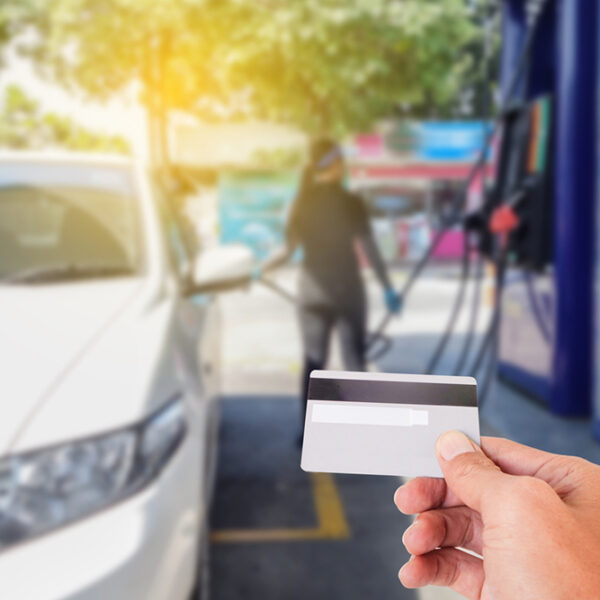Fuel Cards – Types and Benefits
Gasoline or fuel cards are versatile tools that can be used for personal and business-related fuel purchases. These cards are not limited to individual vehicle use; they can also cover the fuel needs of an entire fleet owned by the company. Over time, these cards gained popularity for their convenient method of managing fuel expenses. Additionally, some providers offer users access to fuel coupons, enabling them to benefit from various deals and save money.

What are gasoline cards?
Gasoline fuel cards, also known as fleet cards, are payment cards that are primarily designed for paying for gasoline, diesel, and other types of fuels at specific gas stations. In addition to fuel, some of these cards can be utilized to cover vehicle maintenance and other related expenses. Typically, these cards function similarly to credit and debit cards and are often offered by major fuel companies, certain banks and financial institutions, and third-party providers specializing in gasoline or fuel cards.
Types of gasoline cards
There are different types of gasoline cards available, each tailored to specific needs.
- Universal gasoline cards
Companies with vehicle fleets widely use these cards because they are highly convenient , providing access to nearly all gas stations. By partnering with multiple fuel companies, these cards allow drivers to fill up and pay for gas at any location across the country. That said, these cards often come with usage limits such as daily, weekly, or monthly spending limits, as well as restrictions on the time of day or day of the week for fueling or the number of transactions. These limitations are generally useful for companies looking to keep track of their fuel expenses. In addition, most universal card providers offer fuel coupons to larger fleets for additional savings. But, it is important to be aware of any associated fees, terms, and conditions. To prevent paying for unnecessary charges, always research and check with the card provider company for details. - Gasoline fuel credit cards
These business fuel credit cards are typically affiliated with major payment networks. Such cards are issued by banks and companies that offer commercial payment solutions. Unlike conventional credit cards, these cards are limited to making purchases at gas stations and other merchants associated with the maintenance and repair of vehicles. Similar to universal cards, these types of gasoline cards also come with some purchase controls, but these are typically less stringent than those of universal cards. - Major oil and gas cards
Branded cards are specialized cards offered by some of the top oil and gasoline companies. These cards typically come with gasoline coupons or rebates that are applicable for use only when one makes payments at the company’s own gas station. These discounts are usually capped to a maximum amount, and in most cases, the fuel coupons are valid until one has reached a fixed number of gallons or for the first few months after signing up for the card. Generally, these discounts are available for at least the first six months after signing up. While they offer significant savings on fuel costs, using these cards limits access to a specific affiliated gas station, unlike universal gasoline cards. - Cardlock network cards
These network cards cater specifically to the needs of commercial fleets of vehicles. These networks have strategically located fuel stations offering a variety of fuels and related products for commercial vehicles. Many of these networks provide their own gasoline cards, which can be used at the network’s fuel stations and truck stops. The fuel stations are typically located near major freeways and within metropolitan areas, making them easily accessible for commercial fleets traveling along common routes. Additionally, these stations are equipped with satellite pumps and high-speed fueling, ultimately saving valuable time for the business managing these fleets. In addition to these conveniences, the cardlock network cards provide discounts and fuel coupons to businesses to save on fuel expenses.
Advantages of using gasoline fuel cards
Gasoline cards offer several benefits, whether they are used for business purposes or personal requirements.
- Convenient and efficient
Fuel cards offer significant benefits for both individuals and businesses with vehicle fleets. These cards eliminate the need for cash transactions, making the refueling process faster and more convenient. All one has to do is swipe or tap the card at the specific gas station, and the transaction is automatically processed, simplifying the entire process. - Seamless tracking and management of expenses
Fuel cards function quite similarly to credit cards. This means one gets a detailed bill or report that lists all the fuel and vehicle-related expenditures made using the card. This feature is beneficial as it helps track expenses, review the transaction history, and access data like total gallons purchased and number of miles driven. With the help of this data, companies can develop a budget for future fuel expenditures to maintain business expenses. - Discounts and rewards
Some of the major providers of fuel cards often include perks such as discounts, reward points, cashback offers, and gasoline coupons as part of their packages. These benefits can lead to substantial long-term savings on fuel expenses. - Security protection
With certain limitations in place , such as the number of users and the specific gas stations, a fleet fuel card can prevent fraudulent transactions. These cards also require one to follow certain authentication steps, like entering a PIN number.





